| Patriot Outreach Supporting all Military Service Men, Women, Retirees, Veterans, Government Civilians, Battlefield Contractors, First Responders and their Families. |
| Home | My Story | Get Help | What's Happening | About Stress & PTSD | News & Reports | Donate | Mission | Contact |
 Survival Strategies in War and Bringing Them Home
Survival Strategies in War and Bringing Them Home
Dr. Raymond M. Scurfield, DSW, LCSW
Vietnam Veteran and author of A Vietnam Trilogy. (New York: Algora)
About Dr. Scurfield Current C.V.
PDF Version Word Version
Functional War Survival Strategies And How They May Become Prolonged
Problematic Survival Strategies And How They May Become Prolonged
[Survival modes in war and bringing them home.doc Rev. March 26, 2007]
Adapted from two books in my Vietnam Trilogy: Chapter 3, pp. 23-32 in A Vietnam Trilogy. Veterans and Post Traumatic Stress: 1968, 1989 & 2000 (NY: Algora, 2004) and Chapter 4, pp. 84-90 in War Trauma. Lessons Unlearned From Vietnam to Iraq (NY: Algora., 2006).
Functional War Survival Strategies And How They May Become Prolonged
Fight or Flight
You meet and engage in fighting the enemy and coping and surviving actions in the day-to-day struggles in a war-zone. Conversely, in the face of overwhelming and inescapable exposure to the stressors in a war-zone or to overwhelming enemy forces, you choose to leave and get away. These are the two classic and instinctual survival strategies that have been genetically imprinted in human beings over the millennia, instinctual responses that have ensured the survival of the human species from the days of the cave dwellers and up through modern times.
Conversely, there is a potential downside to this dual survival strategy. A number of war survivors, after they have left the war-zone, may have found themselves plagued with feelings of guilt, shame, grief or unremitting rage over what they did to survive (e.g., “tactical retreat” or flee) or survive during the war. And so this may be bothering you now, and/or it may come back to haunt you months or years from now.
Detachment, Numbing And Denial
You learn how to protect yourself against the horrors of what you are witnessing and do so by convincing yourself that “it don’t mean nothin’ ”, no matter what happens. You learn to self-anesthetize to not feel what otherwise would be overwhelming---anxiety, fear, shock, horror, depression, loss, grief.
This was described by a war Veteran about himself and his cousin who were plagues for years about horrors they had been exposed to:
| Somehow along the way, Dub and I both managed to put up a wall around this issue [the recurring traumatic memories]. There is nothing honorable in killing. Nothing is as horrible as the inner soul-rendering scream that comes with the first time. Then the numbness comes to silence it. Numbness is a narcotic to the soul. Numbness takes over your life and has a death grip on you until (if) you finally reach a point of total security with being home among family and friends. There is nothing to glorify what we do in war. |
And so, numbing, detachment or denial can be at least a temporary refuge from the terrible memories or continuing struggles. Furthermore, you may get so good at detachment, denial and emotional numbing that you carry this with you long after the war has passed. For example, a number of family members of war Veterans have described their Veteran family member as not able to show or perhaps even feel normal emotions like everyone else and that they are emotionally inaccessible.
Tunnel Vision
In the face of daily life in the war-zone and/or the continuing, seemingly relentless challenges and stresses post-war, you learn how to maintain an intense, focused, full attention in order to complete particular tasks and become impervious to whatever else is going on around you. Yes, you learn to focus all of your energies and attention on completing the immediate task or objective, such as physically exerting tasks, preoccupation with completing various disaster applications and follow-through (because there always must be follow-through, time and time and time again!) ---to the exclusion of every thing else.
This can be a good, or a bad, skill and attitude that you carry with you. You may find that tunnel vision helps you to get through tough times in the war and post-war. Conversely, you may find that tunnel vision has become so second nature that you have great difficulty or find it impossible to ever turn it off. And this can be devastating to relationships, or to be able to enjoy life fully.
External Discharging Of Emotions
Finding an outlet for the inevitable cumulative build-up of stress, frustration, grief, fear and rage that are inevitable in a war-zone is crucial to surviving. There will be an accumulation of pent-up emotions and these demand an outlet. Such rage may be channeled towards whoever is considered to be “the enemy” and it can go beyond those firing weapons at you to apparent civilians who may o may not be insurgents or allies of insurgents. Such channelized rage, if it is controllable and more anger than rage that you remain in control of, can be very functional, or it can fuel you internal anger in a way that promotes your own resolve that you will persevere, no matter what..
Conversely, there may be an absence of regular opportunities to discharge such pent-up emotions, which is especially likely when there are not readily available targets for such rage—such as in a war that is waged by guerillas, insurgents or terrorists. Thus, pent-up emotions can erupt strongly and unexpectedly, to include possibly towards innocent people, and even towards family, friends, neighbors or random persons that you meet.
This is because the pent-up emotions have to go somewhere. If not expressed outwardly, you may well redirect such feelings inwardly or suppress them, keep pushing them down. And you can carry this home with you, and find it very difficult to share what is going on with you with your family members or even with your close friends. It might continue to build up and then you explode in anger, frustration or grief. Or, you may isolate in an attempt to avoid possibly having your deep emotions and memories triggered or to prevent venting your emotions against others.
Belief in Fate/Randomness/Higher Power
Many survivors of war rely on their long-standing faith in a higher power or Supreme Being to sustain them through the horrors of what they are and have faced. Others find their faith and beliefs severely challenged, or decimated when they come face-to-face with the horrors and inhumanity and seemingly random nature of who was hurt the most and the least.
For example, the first question that some Soldiers often ask after something bad has happened in the war-zone is, “Why me, God?” Or, “Why did this have to happen to ___, God?” Or “How could a caring God allow this happen to me---or to so many good people?” And other Soldiers will ask: “Why me, God”, and “There is a God and I need to reconnect.” Also, there is the issue of morality in a war-zone, such as: “thou shalt not kill” (especially women and children), “thou shalt not commit adultery,” and “what you do to the least of my brethren you do unto me.”
And there is the issue of morality. Do you purposefully exaggerate or lie about what you faced or did in the war? Also, ministers, priests and chaplains can be a source of great comfort and counsel to many disaster survivors and active duty personnel. However, some combat vets have perceived a marked conflict---viewing chaplains as blessing our troops to kill and emphasizing that “god is on our side”---but not on the enemy’s. You may find yourself wondering how can there be a God or higher power who would allow people, and you, to do what they and you do to each other to survive, such as perhaps being mean to or harm Iraqi civilians rather than take the chance that they might be insurgents or insurgent-sympathizers. And you may carry such issues back home.
Problematic Survival Strategies And How They May Become Prolonged
There are additional survival modes that can be very or at least somewhat functional to getting through the immediacy of the dangers and stressors of war. However, they almost always have very serious associated negative impact in ways that almost never are positive to either shorter- or longer-term post-trauma behaviors, mental health, happiness or positive readjustment. I will just briefly mention each of these here.
“Comparing” traumas
One of the most problematic survival strategies is to compare what you went through with, what your trauma faced in war was, with what others went through and to either (1) be bitter, dismayed or depressed that you suffered much more than many others did, or (2) compare your trauma experience as somehow not being as terrible or bad as others. In this latter scenario, you:
| 1 | deny that you are entitled to be having the negative or troubling reactions that you are having and become very self-critical at your own “weakness” or | |
| 2 | you do not allow yourself the right to feel how you are feeling or what you went through or | |
| 3 | you feel guilty that you are having the troubling feelings that you are having because “your trauma was nothing compared to so many others. |
All of these are no-win propositions. Your traumatic experience was your traumatic experience, period. It was and is meaningful to you and to “compare” war traumas is not fair to anyone.
Be Enraged
If you are going to allow any feelings to emerge, you let it be the one motion conducive to survival in the face of trauma and continuing overwhelming stressor --rage directed at whomever you consider to be the enemy. Unfortunately, this is extremely difficult to do when you are in a guerilla war or war fought by terrorists or insurgents because such enemy uses stealth, surprise and quick retreat, not leaving an easy target to vent your rage and frustrations towards. And thus you can become increasingly agitated and frustrated, if not undependable, unstable or engaging in inappropriate acting out against others. And you can continue this unsatisfied, pent-up rage, impulsive and other inappropriate behaviors long after the war has come and gone . . .
Isolation
Isolating oneself from others, not letting anyone get close emotionally is another common way to promote detachment. The remarkable bonding that occurs among fellow and sister trauma survivors during and in the more immediate aftermath of trauma is a two-edged sword. It helps you to survive the otherwise un-survivable. On the other hand, when you lose a close comrade (through death, moving away, never coming back), it can be devastating. And so a number of war survivors decide at some time during their deployment not to let anyone get too close---because it hurts too much when they are maimed or killed. And they carry this attitude with them.
And they might get to the point where they believe that only other survivors of war in Iraq or Afghanistan who experienced what they did—and who feel like they are feeling---could possibly understand them; and those are the only people they want to be around, because they find that they cannot feel very comfortable with almost anyone who isn’t a fellow or sister survivor. Still others vets find themselves avoiding any meaningful discussions or interactions with other war survivors, and don’t want to talk about it or hear others talk about it---because it brings back too many disturbing memories and too much pain.
Drinkin’ and Druggin’
Substance use and abuse are two of the most common tactics for trauma survivors to use to achieve detachment and relief. And for military personnel, the military historically has made cheap or even free alcohol readily available.
And so, many people who may had had substance use problems prior to the war (or war or other trauma) may turn out after the trauma to have an even bigger substance use problem—because this is how they characteristically respond to stress and unhappiness. And this can become or continue as a habit, even when the aftermath of the war fades into the background. because you are someone who has learned to rely on substances to numb out and get temporary relief when things get rough or you’re feeling down.
Risk-Taking/Thrill/Sex Addiction
Another survival strategy in war is to become immersed in and “addicted” physiologically, psychologically and behaviorally to the thrill, the risk, the danger, the adrenaline rush. And sex may become readily available as people take advantage of each other. Sex can be bought, or forced and yet another way to anesthetize yourself and provide a relief from the intensity, the danger and the isolation and loneliness of war and post-war life. Or, you can become action junkies in other ways, which can be a powerful elixir to help you survive, or it can lead to increasingly more dangerous attitudes and behaviors. And needing this rush may become extremely difficult to simply turn-off or satisfy when the trauma-induced emergency conditions begin to fade and unrelenting normalcy, day-to-day, sets in.
However, some of you will be able to constructively sublimate the adrenaline habit through successful post-war employment in high-risk, high-thrill occupations and jobs such as, post-disaster relief, emergency medical, fire and rescue, law enforcement, off-shore and oil pipeline, contract positions in support of military operations. Conversely, others of you will satisfy the risk/thrill/sex addiction craving by constantly looking for life on the edge, the extreme, unsafe high-risk behaviors and/or stay immersed in memories and feelings about war and danger.
As an example of dangerous risk-taking, an alarming number of recently returned Iraq Army and Marine Veterans have been killed in single-occupant vehicle accidents.
| We absolutely have a problem . . . The kids come back and they want to live life to its fullest, to its wildest. They get a little bit of time to let their hair down, and they let their hair all the way down and do everything to excess. They drink to excess They eat to excess. They part to excess. And then, some drive . . . They want something that goes fast and keeps that high up they had during the war . . . speed fills some indescribable urge for excitement that they’ve felt since returning from war . . . Going fast is like a drug---the newest crack out there. |
Bizarre Or Gallows Humor
In the midst of horror and chaos, resorting to what otherwise would be seen as gross or inappropriate humor can be at least a partial anti-dote to the trauma of war and the destruction and disruption that one is immersed in. One Veteran’s humor:
| Hey, John: we seem to have an extra leg among all these body parts from the last mass casualties we received. Since I can’t figure out which body it belongs to, I’m going to give this here guy a third leg---that’ll give the body handlers stateside a little surprise when they open up the body bag. |
And what are examples of bizarre or gallows humor among disaster recovery workers, police/fire/emergency medical first responders? It helps to stop you from crying, or becoming overwhelmed by what you’re facing day after day after day. Instead, you can get a deep belly-laugh, a moment of absurdly hilarious respite, a closeness and comradeship with the only people who could possibly get it or tolerate such humor---your buddies who have experienced and lived with what you have experienced and lived with.
But, if taken to the extreme, it really is a temporary respite; it is nasty, and it doesn’t erase the horror from your mind or from your heart. And you can carry that bizarre humor with you in either a positive or negative way in the war-zone or afterwards.
| 1 | Positively, you may be able to have an irreverent attitude, an enjoyable or refreshingly unexpected or amusingly sarcastic or humorous attitude that at least some others may find to be a welcome respite, especially during tough times. | |
| 2 | Or, you can have a really sick, pejorative, nasty, insulting attitude and behavior and you can be really inappropriate towards others, and could care less. | |
| 3 | Or, perhaps you fall somewhere in-between (like I have been accused of at times). |
Dehumanizing The Enemy
There is one last survival strategy that is a paramount strategy among military personnel. I will describe how this is manifest in military combat personnel—and you decide if there is any applicability to you and your comrades and your situations.
Training for war inculcates the new recruit in the classic detachment strategy---dehumanize the enemy. “They are not human beings like we are; they are horrible, evil, heartless, immoral.” And racism and extreme ethnocentrism are key dehumanizing strategies in which there is a promotion of racial and ethnic negative stereotypical attitudes and language directed towards the enemy--- krauts, japs, slant-eyes, gooks, towel-heads, A-rabs, Muslim radicals. And I have heard about the racist-laden pejorative term being used by a number of Iraq Veterans , “sand-niggers.”
One Iraq Veteran described how what happened to Vietnam Veterans parallels what is now happening with a number of Iraq Veterans, beginning with the realization that the original mission or justification given for the war proved to be false.
| There was a progression of thought that happened among Soldiers in Vietnam. It started with a mission [in Vietnam]: contain Communism. That mission fell apart, just like it fell apart now---there are no weapons of mass destruction. Then you are left with just a survival instinct. That, unfortunately, turned to racism. That’s happening now, too. Guys are writing me saying, ‘I don’t know why I’m here, but I hate the Iraqis.’ |
It is much easier to seek out an enemy who you have dehumanized to kill rather than an enemy who is regarded as human, good, an honorable adversary, fighting for a just cause. And you can become cut-throat, cold, uncaring---and carry this denigrating attitude with you for a very long time. For example, I have met a number of World War II Veterans who still have a vitriolic hatred towards the Japanese or the Germans---any Japanese or Germans. And I continue to meet too many Vietnam Veterans who continue to maintain a vitriolic hatred towards the Vietnamese, any Vietnamese---be they living in Vietnam or here in the U.S. And this profound hatred inevitably seeps into and contaminates on-going attitudes about others, and about life.
And do you find yourself getting resentful and intolerant of those who seem unable or unwilling to “let go” of being war Veteran, or those fellow and sister war Veterans—and civilians---who do not share your strongly-held view of the justness of this war and how “right” or “necessary” it really is—or how well or not Iraq Veterans and Veterans of other wars are being treated by the military and by the VA after they have returned from deployment? Or do you find yourself feeling less and less compassionate or concerned?
END
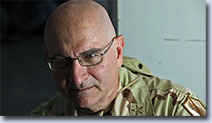 My Testimonial COL Antonio P. Monaco |
| Featured Articles |
The Real Cost of the War A special report: Why is the U.S. ignoring battle-scarred soldiers?  Warning Signs, Triggers and Coping Strategies Warning Signs, Triggers and Coping Strategiesby COL Kathy Platoni (Psy.D.), 307th Medical Group |
| Guidelines and Materials |
 Guidelines for Guidelines for Vets' Families Important advice for families of Veterans to help them cope and overcome stress. |
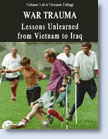 War Trauma: Lessons Unlearned from Vietnam to Iraq War Trauma: Lessons Unlearned from Vietnam to Iraqby Dr. Raymond M. Scurfield, DSW, LCSW Order the Book |
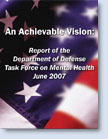 Task Force On Mental Health Report Task Force On Mental Health Report Department of Defense PDF Format |
| Support |
 God Bless the USA God Bless the USA Special Video Feature |
 Reason & Emotion Reason & EmotionEnjoy a Walt Disney Classic! |
 LifeLine Resources LifeLine ResourcesBest Online Support |
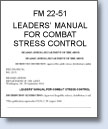 FM 22-51 FM 22-51 Leaders' Manual for Combat Stress Control |
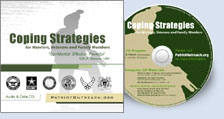 Coping StrategiesTM A special Multi-Media CD - an offline version of the PatriotOutreach website |
 Freedom FreedomA touching video about why we honor, cherish and celebrate freedom. |
 Sounding Off! Sounding Off!Listen in! and, discover more insights, news and feedback. |
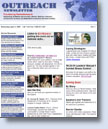 Outreach Newsletter Outreach Newsletter Sign up for the debut issue the Patriot Outreach email Newsletter. FREE |
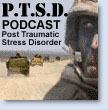 PTSD Podcast PTSD Podcast(Coming Soon) Get answers, help and news about stress, PTSD and Vets' issues. |
 Brainwashing Booklet Brainwashing BookletPrepare to be shocked! Explore the secrets and history of mass mind control. |
Write to us at: Patriot Outreach, 816 North Main Street, Suite 126, Lansing, KS, 66043
or
Call Toll Free: 1-866-96-STRONG (866-967-8766) (8am to 4pm Pacific Time) Email: info@PatriotOutreach.org
Copyright 2006-2011 Patriot Outreach
